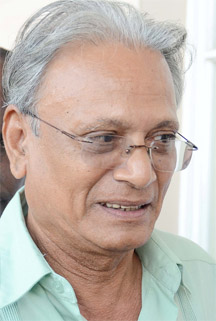As the furore continues over the awarding of a US$18.1M contract to Surendra Engineering to build a specialty hospital, Chairman of APNU, Dr. Rupert Roopnaraine says that a Public Procurement Com-mission would have been the body to deal with an issue of this magnitude.
Despite commitments by successive PPP/C administrations, such a Commission is still to be set up. The contract for the specialty hospital which is to be built at Liliendaal has been enveloped in controversy after one of the bidders, Fedders Lloyd objected to the award to Surendra Engineering, as it claimed that the company had breached tender document stipulations.
“The thing needs a really proper examination,” Roopnaraine said on Sunday. He said that a public procurement commission would have been the body to deal with the issues even as he declared that the National Procurement and Tender Administration Board (NPTAB) has not handled well, a number of the functions entrusted to it. “It’s a very large and expensive project,” Roopnaraine said. “From what is emerging, there are enough anomalies and peculiarities about the contract.”

The Constitution, which was amended in 2001 to provide for the establishment of a Public Procurement Commission, says that the purpose of the Commission is to monitor public procurement and the related procedures to ensure that the procurement of goods, services and the execution of works are conducted in a fair, equitable, transparent, competitive and cost effective manner.
The main functions on the Commission are to: Monitor and review the functioning of all public procurement systems to ensure that they are in accordance with law and such policy guidelines as may be determined by the National Assembly; Safeguard the national interest in public procurement matters, having due regard to any international obligations;
Monitor the performance of procurement bodies with respect to adherence to regulations and efficiency in procuring goods and services and the execution of works; Approve of procedures for public procurement, disseminate rules and procedures for public procurement and recommend modifications thereto to the public procurement entities;
Monitor and review all legislation, policies and measures for compliance with the objects and matters under its purview and report the need for any legislation to the National Assembly;
Monitor and review the procurement procedures of the ministerial, regional, and national procurement entities as well as those of project execution units; and Investigate complaints from suppliers, contractors and public entities and propose remedial action.
Among the other functions, the Commission has the power to investigate cases of irregularity and mismanagement and propose remedial action; initiate investigations to facilitate the effective functioning of public procurement systems.
The latest promise made by government was that the Commission would have been established by the end of June 2012 but this has not been done. Presidential Adviser on Governance Gail Teixeira in July had said that the government is ready with its list of nominees for the Commission and accused the opposition of holding up the selection process. Leader of APNU, David Granger has said that it is government who is holding up the process.
The AFC has identified two persons who the party would like to see on the Commission. The Commis-sion will now have to await the end of the Parliamentary recess.
The Procurement Act of 2003 also provides for the regulation of the procurement of goods and services, and the execution of works in order to promote competition among suppliers and contractors as well as fairness and transparency in the procurement process.
In relation to Eligibility requirements for suppliers/ contractors, it outlines the main considerations which include technical competence; availability of financial resources, equipment and other physical facilities; and managerial capability, reliability, experience, and reputation.
The ministry of health is still to answer key questions on the specialty hospital including why a company with major hospital building experience was not chosen. Fedders Lloyd has built around 90 hospitals worldwide while Surendra hasn’t constructed any.
On June 26, the bids of the five companies that had submitted tenders were opened. The bidders were: Fedders Lloyd (US$17,679,000 after a 23% discount); Shapoorji Pallonji (US$42,473,600); Jaguar Overseas Limited (US$15,658,000) and the Vydehi Institute of Medical Sciences and Research of India (US$19.5 million); and Surendra Engineering (US$18,180,000). After Luncheon announced that Cabinet had given its ‘no- objection’ to the award of the contract to the tune of USD$18,180,000, Fedders Lloyd objected to the award to Surendra Engineering, as it claimed that the company had breached tender document stipulations.
The company on Thursday wrote to the Ministry of Health, carbon copying the correspondence to the Minister of Health, President Donald Ramotar and EXIM Bank of India (which is financing the project), among others, asking that the contract be reviewed and that it be awarded the contract instead.
The letter also included the company’s assessment of the bidding and evaluation process—which prompted it to protest the decision—and it maintains its claims that there were irregularities in the bidding and evaluation process.
Government has accused Fedders Lloyd of orchestrating a campaign against the work of the NPTAB committee and politicising the situation, while saying that it had sought to influence the outcome of the process in its favour since the opening of the bids.


